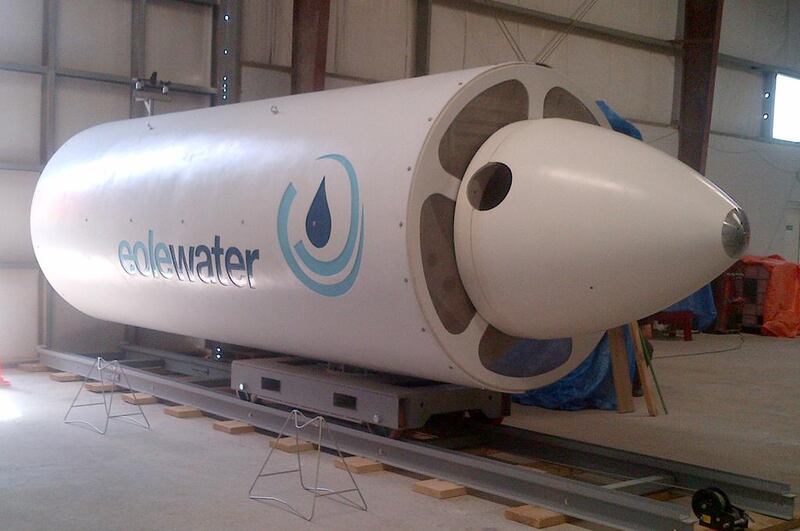DUBAI // A device that can condense drinking water from the humidity in the atmosphere might one day make its way to homes in the UAE.
French company Eole Water is looking for a distributor in the region to supply the solar-powered device, which can produce up to 100 litres of water per day.
The Nerios S3 is the latest model produced by the company and it has already attracted interest from owners of islands on The World development, which does not have access to utilities from the grid.
“In the Emirates, water scarcity is a huge issue,” said Cecile Hourtane, the export development manager at Eole.
“If people can develop their own drinking water in their own homes, that would mean people don’t need to spend so much on bottled water, and desalination needs won’t be so high.”
The Nerios works by extracting the moisture from the air and, after filtration, bottling it as drinking water. It is powered by solar panels that are 45 square metres.
Eole tested a previous version of the system in Abu Dhabi for two years and submitted the extracted water for analysis. It found the quality was within GCC import standards for drinking water, Ms Hourtane said.
“Our tests were done next to a refinery in Mussaffah, so the air was not that clean,” she said.
“However, when we tested the water, it was very pure and free of any pollutants. The machine relies on a system of ultra-filtration, so there is no contamination.”
The initial tests were done using grid electric power. The company then planned to instal a huge wind turbine, near Jebel Ali, that would generate the power for the machine condensing the water.
However, Eole was not successful with obtaining permissions from authorities and the equipment was shipped back to France.
The Nerios S3 is the company’s latest attempt to break into the UAE market.
Raman Ravi, the owner of the Lebanon island on The World, was interested in Eole’s product as there are no utilities on the island and fresh water needs to be brought in by boat. The same goes for diesel, which he used to power the generators that supply electricity to his exclusive beach club on the island.
Fifty tonnes of water arrives on the island every three days – at a cost of Dh6,500 a shipment.
A shipment of diesel arrives once a week – at a cost of Dh20,000.
“For The World islands, I really think this sort of technology, or something like it, is the answer,” said Mr Ravi.
“It’s not sustainable to continue to bring water and diesel from the mainland.”
However, he said he rejected the original idea of the wind turbine because it was too big for his 39,000 square metre island.
“The original one was too cumbersome for the island,” he said. “We needed something smaller and more efficient.
“We have seen this new model by Eole and we have requested more information about it.”
Ms Hourtane said there needed to be more tests on the Nerios S3 in the Middle East but said she was confident it would work.
“There’s the issue of whether the sand in the atmosphere could affect the efficiency of the solar panels,” she said. “That still needs to be studied more.”
However, on the whole, she said she felt solar was better suited to the Emirates than wind turbines.
“There is much more sun than wind in the UAE,” she said. “There is some wind on the coast but, on the whole, sun is more plentiful.”
She added that it was also down to aesthetics: “Across the region, everyone seems to love wind turbines, but no one wants one close to his view.”
mcroucher@thenational.ae






